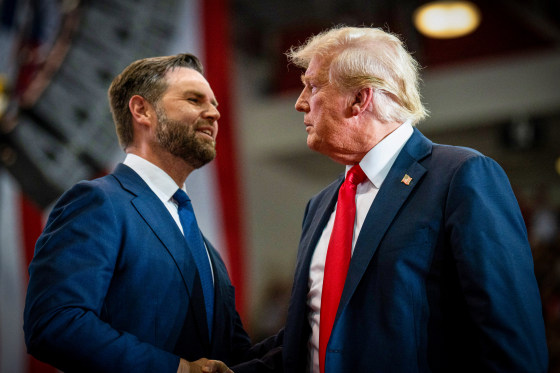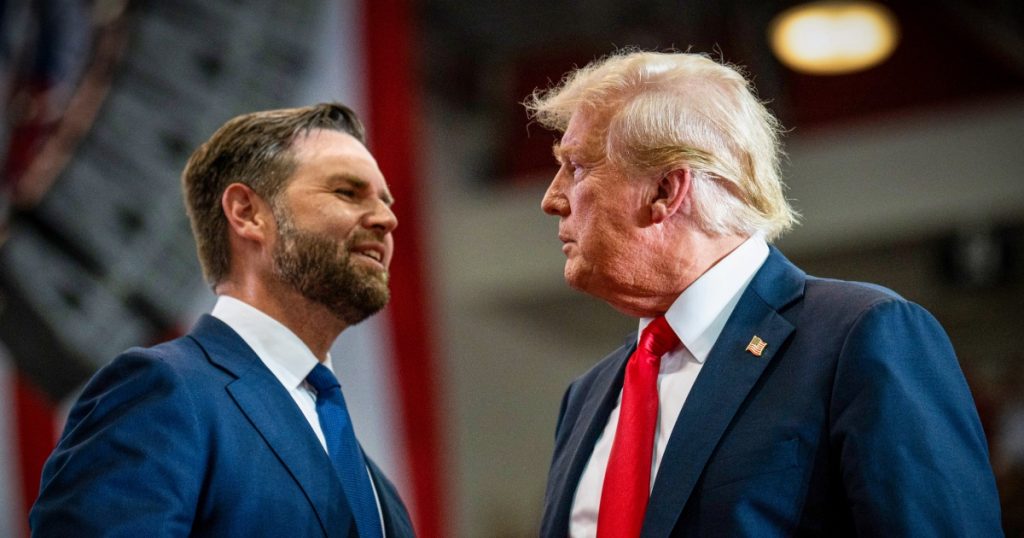Inside Trump and Vance’s ‘buddy level’ relationship

As Sen. JD Vance struggled through his debut this summer as Donald Trump’s running mate, his remarks about “childless cat ladies” running on a loop and distracting from everything else, the former president called to offer reassurance.
“Remember the first week, there were all these stories about Trump regretting his choice?” Vance told NBC News in a recent interview aboard his campaign plane. “He was checking in: ‘Hey, you’re under a level of scrutiny that nobody has really faced except for me.’ And he was just being supportive and providing moral support and cracking some jokes.”
Two months later, Vance’s disruptive presence on the Republican ticket is again the subject of headlines. He amplified unsubstantiated rumors about Haitian immigrants eating pets in Springfield, Ohio — claims that Trump repeated last week during a debate in which he also suggested that he and Vance weren’t on the same page about abortion. But that early and encouraging phone call, which Vance described as “heartwarming,” remains a window into the relationship he and Trump have built.
Trump is “immensely happy with JD’s performance,” said a person who speaks with Trump and is familiar with his thinking. The former president clicks with Vance “on a buddy level,” another person familiar with their interactions said. They talk by phone frequently.
“They have chemistry,” said Garrett Ventry, a Republican operative who is close to the Trump world and Rep. Elise Stefanik, R-N.Y., who was once under consideration to be Trump’s running mate. “They’re friends.”
Trump, though, is known to sour on people — even those close to him. His relationship with former Vice President Mike Pence essentially ended when Pence refused to block certification of the 2020 election results and Trump sat idle as an angry mob stormed the U.S. Capitol on Jan. 6, 2021, chanting, “Hang Mike Pence.”
Even Trump’s mildest rebukes have the potential for public embarrassment, like when he suggested Vance had gotten too far ahead of him by saying on NBC’s “Meet the Press” that Trump would veto a national abortion ban.
“I didn’t discuss it with JD, in all fairness,” Trump said when pressed on the issue during his debate last week with Vice President Kamala Harris. “And I don’t mind if he has a certain view, but I think he was speaking for me.”
Vance said Sunday that he had “learned my lesson on speaking for the president before he and I have actually talked about an issue” in a return to “Meet the Press.”
Vance is hemmed in by an operating principle of the Trump world: that no one speaks for Trump other than Trump. That sets up an unorthodox relationship, since vice presidential candidates are expected to speak for the ticket.Marc Short, Pence’s former chief of staff and a contributor to “Meet the Press” and CNBC, warned that the mercurial Trump’s warm feelings toward Vance could vanish in an instant should Vance find himself at the center of a story he doesn’t like.
“Who initiated the story about Haitians stealing cats and dogs?” Short said, pointing to Vance. “Maybe they still view it as a positive, that it’s focusing conversation on immigration. I don’t know that it is.”
The abortion hiccup notwithstanding, Trump and Vance at the moment are largely in sync. While there is no standing scheduled call between them, they speak by phone almost daily, said two people familiar with the interactions who, like others interviewed for this article, were granted anonymity to share details about private conversations. The calls are often random or as needed, when one or the other is curious about something, or when Trump is pleased with a particular TV appearance.
Sometimes, Vance said in the interview on his plane, they talk “multiple times a day.” He was one of the first people Trump called Sunday after an apparent assassination attempt. At a campaign rally Wednesday in Raleigh, North Carolina, Vance recalled receiving the call while sitting at home with his 7-year-old son.
“The president calls me and he says, ‘JD, they just tried to do it again,’” Vance said. “And he kind of told me the story of what would then become public a couple hours later. And of course, my first thought was, ‘Sir, are you OK?’”
Few complaints or concerns about the Trump-Vance relationship emerged in interviews this week with more than a half-dozen Republicans close to one or both men. Trump, by nearly every account, is delighted by Vance’s defiant posture on Springfield and combative presence on television.
Trump, the person who speaks with him said, appreciates that Vance remains composed even in confrontational interviews, including one Sunday on CNN’s “State of the Union” that featured several tense exchanges with host Dana Bash.
“He’s not a hothead,” this person said, drawing a comparison to Arizona GOP Senate candidate Kari Lake and Rep. Marjorie Taylor Greene, R-Ga. “Generally the people that identify as Trumpian are hotheads. Your Kari Lakes, your Marjories — these people that feel like they’re close to the president and they embody his spirit … it’s not entirely accurate, because they miss the nuance of Donald Trump’s unwillingness to escalate unnecessarily. He’s very deliberate in his escalation of issues, and JD gets that uniquely.”
On the phone, Trump and Vance discuss issues of the day, the people familiar with the calls said, but they’re more likely to spend the time catching up on what they’re seeing and hearing on the trail.
Their chats aren’t deep dives on policy, meaning that Vance occasionally has to improvise when asked in interviews to weigh in on Trump’s positions.
The day after last week’s presidential debate, when podcaster Shawn Ryan asked Vance what a Trump-negotiated end to the war in Ukraine would look like, Vance speculated about a demilitarized zone between Ukraine and Russia and a ban on Ukraine joining NATO. Asked about the remarks, a Trump senior adviser told NBC News that Vance’s answer didn’t amount to a “specific proposal” of Trump’s but, rather, “concepts that could be part of a comprehensive plan that ends the war and stops the killing.”
‘I don’t see any daylight between either of them’
Vice presidents and vice presidential candidates occasionally speak out of school. Then-Vice President Joe Biden’s declaration that he supported gay marriage, for example, came before President Barack Obama was ready to embrace the issue and was a tension point in their 2012 re-election campaign. But the notion that the recent instances involving Vance show meaningful distance between him and Trump is a false one, those close to them said.
Trump and Vance “share positions on all the major issues influencing America,” said Brian Hughes, a senior Trump campaign adviser, adding that Trump picked Vance “because they share a passion for an America First agenda that puts American workers before foreign workers, and American foreign policy ahead of the rest of the world’s policies.”
Hughes added that it wasn’t entirely uncommon for running mates to either differ on issues or to try to smooth over policy differences, pointing to how Harris and Biden have differed on fracking.
“I don’t see any daylight between either of them on any issue in America,” Hughes said of Trump and Vance.
Minutes after last week’s debate, Trump and Vance bumped into each other en route to the spin room, where Vance had prearranged interviews. They had a friendly conversation, recapping Trump’s performance and workshopping their talking points, and the abortion ban veto never came up, according to two people familiar with the details of the discussion. If Trump was annoyed or didn’t trust Vance, these sources reasoned, he wouldn’t have allowed him to go through with his interviews that night or book appearances on news shows the following Sunday.
“Never mind going on three,” one of the sources said, referring to Vance’s appearance on a trio of Sunday news programs last weekend, including the return to “Meet the Press.”
As a running mate, Vance is in an unusually fraught and constrained position. He follows in the footsteps of Pence, a once-obsequious Trump defender whose refusal to block certification of the 2020 election results turned Trump and his supporters against him. And the debate wasn’t the first time Trump marginalized Vance out loud; in the midst of the “childless cat ladies” uproar, he downplayed the “impact” Vance would have on the race.
Vance also has to contend with the dynamic that no one — including his own running mate — can truly speak for Trump. When asked by a volunteer in early September about Project 2025, the conservative transition blueprint Trump has disavowed, Vance suggested the person “remind” voters about this fact.
“Look, trust me,” Vance said. “I know from experience, nobody speaks for Donald J. Trump except for Donald J. Trump, right?”
“Vice President Pence viewed his role as a translator for President Trump to traditional Republican audiences,” a Trump ally said. “Senator Vance seems to be trying to advance ‘America First’ beyond the baselines. It creates a dynamic that provides the opportunity for Vance going too far outside the lines and creating walk-back moments like this past week.”
Short, the former Pence aide, said that the former vice president “was always very careful not to get out ahead of Trump” and that “if he was going to do any sort of interview, he would talk to Trump beforehand for say, ‘Here’s what I intend to say.’”
Trump’s shifted ‘expectation’ for his No. 2
Short also believes the relationship between Vance and Trump is different than the one Pence and Trump had prior to their falling-out.
“The first go around, Trump had obviously not held elected office. And I think that he leaned on Mike for much of that initial experience,” Short said. “I think this time around, he feels like he knows Washington. He knows the players in town. He knows what he wants to do. And so I think his expectation of Vance is probably different. It’s less helping decide on policy or manage. It’s more being a surrogate. I actually think that Vance does that very effectively. And so I would imagine that, as far as what Trump was looking for, I think Vance is supplying.”
Vance has conceded that he doesn’t agree with Trump on everything, but he has adopted a largely deferential attitude. When asked by NBC News in July what role he would like to play in a second Trump administration, Vance replied that he would “help out wherever I’m asked to help out,” while signaling a particular interest in border and immigration issues.
“He is the leader of this party and he sets the agenda,” Vance said Wednesday in Raleigh, referring to Trump and any occasional disagreements they might have.
Vance’s obedience was not always a given. At 40, he’s not a generational peer of the septuagenarian Trump. And his emergence as a public figure nearly a decade ago is tied to his best-selling memoir, “Hillbilly Elegy,” which turned him into a talking head filled with piquant anti-Trump takes during the 2016 campaign.
It was only ahead of his 2022 run for Senate in Ohio that Vance transformed into a Trump devotee. His conversion was convincing enough for Trump, whose endorsement that year lifted Vance out of a crowded GOP primary. Vance is the unique vice presidential candidate who essentially owes his political career to the presidential candidate who picked him.
And Trump enjoys seeing the same young and articulate Yale Law School graduate who once was a strident critic now defending him on TV.
“He loves that he has a smart person with balls who doesn’t only do Fox,” a person close to the campaign said.
Vance’s intelligence is a particular fixation for Trump. The former president brags to others about Vance by describing himself as a talent evaluator in the mold of legendary Green Bay Packers coach Vince Lombardi — someone who picks the best athlete, regardless of position, and builds a team around him.
“He’ll tell that story in reference to JD,” said a person who has heard Trump tell it. “‘Lombardi picked the best athletes for football, and I picked’ — and he’ll point to his head — ‘a mental athlete.’”
Source: https://www.nbcnews.com







More Stories
India Plane Crash: What Investigators Might Examine
Washington Post Cancels Ad From Groups Calling for Trump to Fire Musk
As Trump Attacks D.E.I., Some on the Left Approve